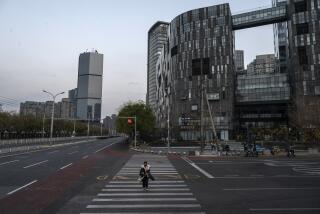The Party That Turns People Off : Beijing hard line undermines China’s interests
- Share via
The hot consumer items on the streets of Beijing these days are $2 T-shirts bearing such slogans as “I’m Bored,” “I’m Really Tired” and “I’m Depressed, Leave Me Alone.” They’re the latest manifestation of passive protest--the only kind Chinese can safely practice--and the malaise they reflect could only have been deepened by the Communist Party’s exuberant 70th birthday celebration this week.
At the culminating anniversary event in the Great Hall of the People on Monday, the harsh, no-quarter line that has been party doctrine since the ruthless crackdown on dissenters two years ago was reaffirmed. Forget about political pluralism and forget about democracy, proclaimed party leader Jiang Zemin; China’s destiny is to remain a socialist dictatorship. The faithful, among whom were some who have been around far longer than the party itself, naturally loved what they heard.
While underscoring the need for vigilance against “hostile international forces” and the party’s rejection of subversive Western ideas, Jiang made clear he was at least aware of the winds of change that have lately howled across much of the communist world. Recent developments have seen the cause “suffering some serious setbacks” is the way he described the collapse of Marxist regimes in Eastern Europe and Africa. But Jiang said he’s certain these setbacks are temporary. In any case, the party is determined to hold to its course. The class struggle, at least in the political sphere, will go on, he proclaimed, meaning that orthodoxy will continue to be demanded.
Economic reforms, however, are to be steadily expanded, or so it’s promised. While Jiang swore that China would never embrace capitalism, nonetheless, he said, “we should fully exploit the role of market forces.” Here is not one contradiction but two. The first is the assumption that market forces can somehow be broadened and made to flourish even as the party insists on maintaining a central planned economy, with its built-in waste, inefficiencies and increasingly evident opportunities for corruption. The second contradiction is that a modern, technology-based economy can be developed even while the party maintains stifling restraints on all unsanctioned political and intellectual activities. China’s current leaders may refuse to recognize the incompatibility between economic progress and political repression, but a successor generation will find it impossible to ignore.
The tough and threatening words being heard from party leaders aren’t likely to win Beijing any sympathy in Congress, which is preparing to ask some tough questions about President Bush’s difficult but correct decision to renew most-favored-nation trading status for China. Among other concerns is China’s abysmal record on human rights; no hope of any early improvement was offered by the party’s leaders this week. Meanwhile, the party’s self-congratulatory anniversary festivities seem only to have added to the dispirited mood noted in Beijing and elsewhere. The market in T-shirts seems likely to remain brisk.
More to Read
Sign up for Essential California
The most important California stories and recommendations in your inbox every morning.
You may occasionally receive promotional content from the Los Angeles Times.













